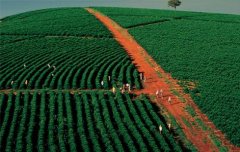A brief introduction to the altitude and climate of the cultivation of Mazu coffee in Alishan, Taiwan

In 1941 (the 16th year of Rizhaohe), most of the raw beans were shipped back to Japan. The coffee planting area in Taiwan has reached 75 hectares, and in its heyday it was known as "the largest coffee factory in the far East". In 1945 (Rizhaohe 20 years), the area of coffee cultivation in Taiwan expanded to 113 hectares after the war. After the surrender of Japan, Taiwan was restored, and the national government strongly advocated the reclamation of fertile land and the cultivation of cash crops. The aborigines of Alishan even wanted to use the countryside or mountains to grow some food to feed their stomachs. No one wanted to grow coffee that tasted as bitter as life, so Taiwan coffee gradually declined and was gradually forgotten by people. In 2000 (1989), it was not until it was publicized by the Taiwan government and the strong support of the Chiayi county government that local farmers began to grow coffee again, and Taiwan coffee gradually revived and developed well in recent years, and was loved by more and more people.
Alishan coffee is the most special and superior coffee in Taiwan, and its output is relatively small, and it is precious because it is rare. Alishan, located 75 kilometers east of Chiayi City, Taiwan, is located above 2000 meters above sea level, adjacent to the Yushan Mountains and Yushan National Park in the east, surrounded by high mountains, with a cool climate, with an average temperature of 10.6 degrees Celsius in summer and 14.3 degrees Celsius in summer. the average temperature in winter is 6.4 degrees Celsius. The taste is not bitter and astringent, and the flavor is mellow and rich. Alishan's unique climate and altitude conditions give birth to high-quality mountain tea, orchids and what the Japanese call the best horseradish (Washami). The number one coffee in Taiwan is not in Gukeng or Dongshan, but in Leye Village of Alishan Mountain.
The varieties of Alishan coffee are grown in Arabica. This kind of coffee grows in a harsh environment. Taiwan is located in the subtropics. The temperature is higher all the year round, and coffee trees like shade. If coffee trees are planted alone, they may be killed by the strong sun. The Ali Mountains are covered with forests and there are many betel nut trees, so most of his coffee trees are planted in the betel nut garden, because the betel nut trees grow fast and have luxuriant branches and leaves. It can not only absorb the sun but also get shade early, which is very suitable for the growth of coffee. In the coffee garden where Ali Mountain went, the coffee trees are all hidden in the shade of the betel nut trees. Coffee trees are also very strong, and the coffee produced is relatively good. Coffee trees are planted and coffee plants emit different fragrances and tastes according to where they are planted. They are still coffee varieties with great personality. Alishan Coffee in Taiwan is very popular in recent years. The history of Taiwan coffee can be traced back to 1624. In the early days, the Dutch introduced coffee. However, it is limited to drinking among the Dutch, so it can not be widely promoted. During the Japanese occupation in 1931, when the Japanese invaders made great efforts to mobilize farmers to grow coffee for their own needs and for the sake of Taiwan coffee, many farmers lost their fertile fields for growing rice. Although the coffee grown has a bumper harvest year after year, but the coffee has no profit and has lost its food, many coffee farmers have not been able to feed themselves by working all their lives. Mr. Kimura grows and cultivates in large quantities in the areas of Alishan, Nantou and Yunlin in northern Tainan.
Important Notice :
前街咖啡 FrontStreet Coffee has moved to new addredd:
FrontStreet Coffee Address: 315,Donghua East Road,GuangZhou
Tel:020 38364473
- Prev

Introduction to Fine Coffee-A brief introduction to the Market Price of Crystal Coffee varieties in Taiwan
In the 19th century, after the Sino-Japanese holiday, the Japanese occupied Taiwan and tried their best to promote coffee with high economic value. in 1941, Taiwan's coffee output was rich and its taste was good, which created the full period of coffee in Taiwan. however, soon after the launch of the Pacific Coffee in Japan, the sale of coffee became a problem, and there was no one to take care of it. Japan failed to withdraw, and the coffee fell after the lack of money.
- Next

A brief introduction to the description of coffee flavor, taste and aroma characteristics in Papua New Guinea
Another special thing is that the variety of coffee planted by Chimere cannot even be counted with one hand: Typica, Arusha, BlueMountain, MundoNovo, Catimor, Caturra or even more-in fact, just as they don't put eggs in the same basket, most farmers actually plant different varieties to avoid the growth of a particular variety.
Related
- Does Rose Summer choose Blue, Green or Red? Detailed explanation of Rose Summer Coffee plots and Classification in Panamanian Jade Manor
- What is the difference between the origin, producing area, processing plant, cooperative and manor of coffee beans?
- How fine does the espresso powder fit? how to grind the espresso?
- Sca coffee roasting degree color card coffee roasting degree 8 roasting color values what do you mean?
- The practice of lattes: how to make lattes at home
- Introduction to Indonesian Fine Coffee beans-- Java Coffee producing area of Indonesian Arabica Coffee
- How much will the flavor of light and medium roasted rose summer be expressed? What baking level is rose summer suitable for?
- Introduction to the characteristics of washing, sun-drying or wet-planing coffee commonly used in Mantenin, Indonesia
- Price characteristics of Arabica Coffee Bean Starbucks introduction to Manning Coffee Bean Taste producing area Variety Manor
- What is the authentic Yega flavor? What are the flavor characteristics of the really excellent Yejasuffi coffee beans?

